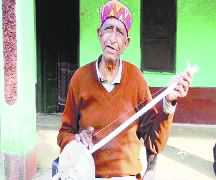Ramesh K Dhiman
It is said that poets, painters and artistes never die though they have to leave this world physically, leaving behind a rich repertoire of their immortal compositions through which we remember them. I was stirred out of reverie, when the ill-tiding about the demise of the doyen of pahari folk singing Pratap Chand Sharma, who we had been hearing since the days of innocence, travelled in on the accursed Tuesday evening. I could never believe that the iconic singer, who gave us the haunting pahari ditty ‘Thandi thandi hawa je jhuldi jhulde chilan de daalu, jeena Kangre da…’, immortalised in his serenading voice, had passed away at his native village Naleti at the age of 90.
Born to Pandit Jhanu Ram and Kalo Devi on January 23, 1927, Pratap’s life had not been a bed of roses. It had indeed been an enduring saga of struggles that he took in his stride and moved on weathering many a storm.
Pratap had once confided in me: “I started singing at an incredible age of just 5, when I would accompany my father, a musical wizard to small family or social functions. I would also perform at some musical functions organised by schools from time to time. This proved a great morale booster for a fledgling artiste to perform at local fairs and festivals attracting huge crowds. But, the first big break I got was way back in 1962, when I got an opportunity to perform before a mammoth crowd in the august presence of the CM of the state. It was Republic Day and the patriotic song that I rendered on the occasion was “Din aazadi da aaya, jhanda Hind te jhulaya, O’ babu langoti waleya…” which evoked a thunderous applause from the spirited audience, besides Rs 18, a hefty amount then, as an award from the teachers for my rendition.”
Abject poverty that he inherited from his forefathers and, of course, the responsibility of hearth and home continued to chase him like his own shadow that left him stuck between the devil and the deep sea. He was barely 8, when he was anointed into taking up odd jobs like crushing stones and doing sundry other jobs to keep the kitchen fire burning. Then tying the nuptial knot at 14, much against his wishes, the sudden demise of his father and losing out the ancestral house to the heavy rains, triggering another spell of miseries and misfortunes.
Pratap, popularly known as ‘Dantarewala’ among his friends and fans, would create haunting folk tunes on his ‘iktara’, which held sway over the rural and urban audience alike. He has penned more than 200 songs on a variety of themes. The songs he composed depicting varied folk themes — love, lore and longings — were a hit with the teeming millions of fans across the country. He was on cloud nine, when he discovered that the songs ‘Jhulde chilan de dalu… and ‘Je tun chaleya Nefa naukri, mere galle de haare lainda jayan, naina deya lobhiya…’ composed by him in the’60s took phalanx of his ardent admirers from across the country by storm.
In an interview at his native place, a decade or so ago, he told that the snow-spangled hills and dales dotting the commanding Kangra valley had greatly inspired him to compose his theme poetic compositions. He had also admitted that the songs that became an instant hit with the audience were composed sitting along the serenading streams, the chirping birds of all feathers and the passionate notes of whooshes of winds always provided him a perfect backdrop for a serious thought. The songs that Pratap has composed are a winsome blend of music and muse. And, when rendered in his well-modulated voice, these created a typical rural metaphor. His unique singing style has enriched the traditional pahari folk singing by maintaining the rustic simplicity and serenity.
Pratap once said: “In those days, with scarcity of all modes of transport in the godforsaken hilly areas, we had no option, but to trudge as many as 30 miles a day to perform in areas like Shimla, Chamba, Kangra, Dalhousie, Nahan, Kalpa and other remote areas to perform.” He had, during the interactive session, gone nostalgic sharing glimpses from his long journey into folk music. He said his joys knew no bounds when he got his first break on AIR in 1968, where he was invited to perform. He also regularly performed at the Jalandhar Kendra of Doordarshan. His 10-year-long stint at the Department of Songs and Drama Division, government of India, had been wonderful. He continued to be associated with the state’s Public Relations Department for two decades. The condolence messages that have been pouring in thick and fast from his numerous fans from across the country speak about his popularity in the distant corners of the state of Himachal Pradesh and elsewhere. In his condolence message, Chief Minister Jai Ram Thakur had said: “Pratap Chand Sharma had contributed a lot to the promotion of traditional folk music of the day, for which he would be remembered for a long time.”
Songs immortalised by Pratap Chand
‘Thandi thandi hawa je jhuldi jhulde chilan de daalu, jeena Kangre da…', ‘Do naaran ve loko, lashkdiyan talwaran…’, ‘Kaalua mazdoora’o dera tera doora’o kadi ghar auna…’, ‘Drekan taan phulian bani thani pardesiya veera…’, ‘Jaage gariban de bhag mitra…’, ‘Pakharuye di run-jhun layan gulabo goriye…’, ‘Naale paar biyaein jaana, which biyahein nachna gaana…and many more...
Unlock Exclusive Insights with The Tribune Premium
Take your experience further with Premium access.
Thought-provoking Opinions, Expert Analysis, In-depth Insights and other Member Only Benefits
Already a Member? Sign In Now










